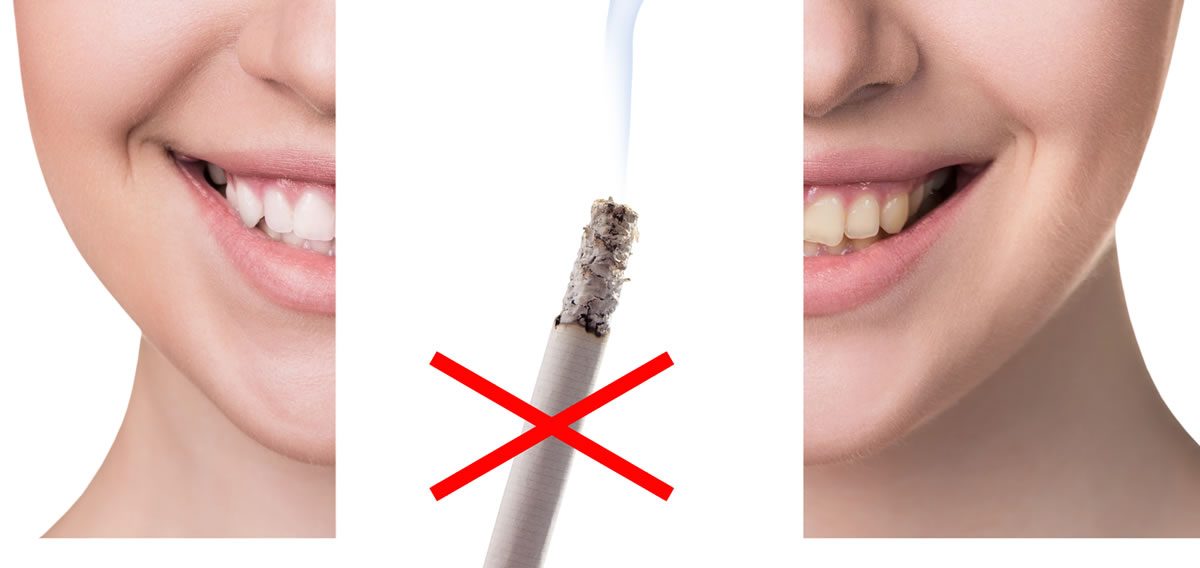You have likely heard time and again that smoking and chewing tobacco products can have a serious impact on your oral health. But what does smoking actually do to your mouth and why is it such an issue? Read on to discover the real reasons why smoking is one of the most destructive habits when it comes to your oral health and the serious health risks that come with it.
Yellowing stains
Smoking is well known for the yellowing effect it has on teeth. This discolouration is actually stains left by the nicotine and tar found in cigarettes and other tobacco products. Yellowed teeth can be extremely difficult to whiten, depending on how deep the stains actually are and for how long they have been exposed to the various chemicals found in tobacco products. Exposing your teeth to these chemicals weakens the tooth enamel, the protective layer that cannot be replaced, causing teeth to become vulnerable and allowing stains to become deeply set into teeth.
Rotting teeth
Because the chemicals in tobacco products weaken the tooth’s protective enamel, teeth become more susceptible to bacteria, acids, and other destructive substances. With no protective layer, these substances can eat away at teeth and eventually cause them to rot right down to the tooth root. This can be extremely painful and can cause teeth to become loose, requiring removal, and even falling out. This rotting can also lead to infection which leads to even larger issues. Smoking causes a lack of oxygen in the blood, which your body needs in order to fight these infections. Being less able to naturally fight infection can also lead to major issues such as gum disease.
Gum disease
Decreased levels of oxygen in the blood leads to a weakened immune system and leaves your mouth vulnerable to infection. This means that bacteria found in your mouth can more easily build-up and infiltrate your gums. The bacteria can quickly destroy gum flesh, causing it to recede and become loose and unhealthy. The gums help to anchor teeth in place, so when their health is compromised teeth can become loose and potentially fall out. When gum disease progresses it can affect the bones and surrounding flesh, causing them to break down, too. Studies have shown that those who smoke are two times more likely to contract gum disease than those who don’t.
Oral cancer
Tobacco products such as cigarettes, pipes, chewing tobacco, and others are highly carcinogenic. The chemicals found in these products have been cited as a leading causes of many cancers, including oral cancer. According to The Oral Cancer Foundation, there are over 7,000 chemicals found in tobacco smoke, including over 70 known to cause cancer. Oral cancer is especially dangerous in that, generally those who have it are unaware of it in the early stages since it does not produce painful side effects until it has spread. Historically, over 75% of people over the age of 50 who have had oral cancer were regular tobacco smokers at one point in their life. Oral cancer can take many forms including unexplained bumps, bleeding, swelling, numbness, pain, and difficulty swallowing.
Tooth sensitivities
Because smoking weakens or erodes tooth enamel, smokers’ teeth are often vulnerable and can become extremely sensitive to hot and cold temperatures. This can be quite painful and very restricting when it comes to food and drink.
Treatments
There are toothpastes and mouthwashes available on the market produced specifically for those who use tobacco products, however they are not nearly as effective at treating oral issues brought on by smoking as getting rid of the habit is. These products are generally more harsh and abrasive in an attempt to target destructive bacteria but they have no effect in restoring enamel, reversing tooth rot, root rot, gum rot, or preventing any kind of cancer.
Tobacco users especially should visit their dentist regularly to have their oral health monitored closely. If you are looking for a dentist in your area, be sure to consult 123 Dentist’s list of dental professionals in the Lower Mainland.
It’s important to keep in mind that the only truly effective treatment in restoring the health of a smoker’s’ mouth is to stop smoking. If you are a tobacco user, talk to your health care professional today about beginning a smoking cessation program that will work for you.




 December is finally here, and if you’re not already hyped about the holidays, you’re about to […]
December is finally here, and if you’re not already hyped about the holidays, you’re about to […]

